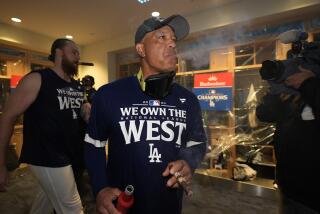AGAINST
- Share via
Like any hostile takeover, the scoundrels launched their frontal attack on the fabric of baseball rather surreptitiously, in this case with something called the designated hitter, a contrived gimmick that changed the delicate balance between offense and defense.
If they could add a 10th man to a game that had done quite well for a century or so with just nine, they could do a whole lot more.
And they have.
Now they play indoors on plastic grass, turning simple ground balls into laser shot singles and bloop singles into turf triples. They have homogenized the schedule, playing interleague games that foul the integrity of each league’s championship season. They happily welcome wild-card teams in the playoffs, turning their once sacred postseason into nothing more than a baseball version of the NCAA tournament.
All that seems benign, however, compared with the outrageous scheme currently being considered. Radical realignment is radical all right, the wholesale shift of franchises from one division to another and more astonishingly, from one league to another.
With appropriate arrogance, these deep thinkers have decided that just because teams have always been in one league forever, that’s no reason for them to stay there.
The problem, they claim, was created by expansion and no spot to comfortably fit Tampa Bay into the mix. Fine. Then don’t expand. Pass up the huge franchise fees for the good of the game.
This scheme was cooked up to cater to baseball’s TV partners and cut travel costs. The great sportsmen who run the game are always alert when there is a dollar to be saved or another one to be made.
So let’s make the Angels and A’s National League teams and the Phillies and Pirates American League teams. Never mind that Cincinnati is a cornerstone team, one of the founding fathers of the National League. Switch them to the American. And while we’re at it, let’s put Kansas City in the National, just to see what happens.
While we’re changing everything, why not drop the traditional league designations. Instead of calling them the American and National Leagues, let’s do what the NHL did a few years ago and name the leagues and divisions after personalities. Then Bud Selig and John Harrington, chief crafters of this bizarre idea, could get full credit.
It was Harrington, CEO of the Boston Red Sox, who explained that wholesale realignment with more than a dozen teams shedding traditional league affiliations would really be a service to the fans.
This, he said, is an attempt to return baseball to its cherished past by establishing geographical rivalries. What a wonderful gesture, but if he really wants to bring back the past, let’s have 16 teams in two leagues and play the World Series games in the daytime, when kids can see them.
Thankfully, some management sorts have their backs up over this foolishness. The Mets, created to fill the National League void in New York after the Giants and Dodgers left, decided moving into the American League might not be such a great idea.
And the Cubs thought one American League team in Chicago would be more than sufficient, expressing a preference to stay where they’ve always been, in the National League.
Clearly, these naysayers are dinosaurs, unwilling to try something new and different and exciting. They probably never would have embraced other great new ideas like New Coke and the Edsel. They probably still call the home of the Giants Candlestick Park instead of that catchy new name, 3Com Park.
Don’t they understand that change is good? Don’t they read baseball’s surveys? Selig and Harrington love to point to polls supporting this wholesale changeover. They probably asked a half-dozen people walking past Riverfront Stadium . . . oops . . . that would be Cinergy Field.
Baseball has had mavericks before. Guys like Bill Veeck and Charley Finley drove their partners nuts with wild ideas like exploding scoreboards and donkeys grazing in the outfield. But that’s mild stuff compared with what the current proprietors have in mind.
Finley once thought one way to speed up the game would be to use three balls for a walk and two strikes for a strikeout. His partners blanched at that idea. Was it any more outrageous, though, than having his old team playing in the National League instead of the American?
The realignment rebels argue that baseball must change with the times as the world moves toward the 21st century. OK, fine-tune it, then. Don’t turn it into some unrecognizable mutant sport.
There is hope. Management has approached the players union with a plan to get rid of the DH scourge. It is a start.
What they ought to remember is when they reinvent the wheel, they must make sure it’s round. Otherwise, they’ll have a terrible time driving the truck.
More to Read
Go beyond the scoreboard
Get the latest on L.A.'s teams in the daily Sports Report newsletter.
You may occasionally receive promotional content from the Los Angeles Times.







